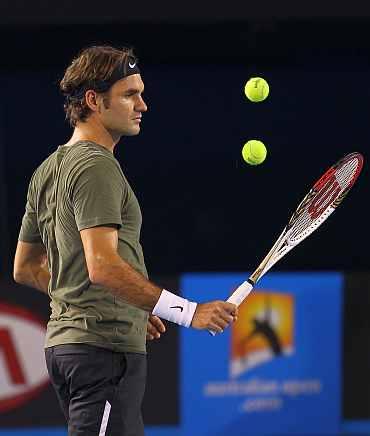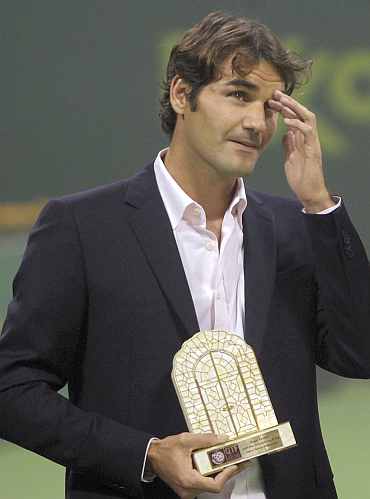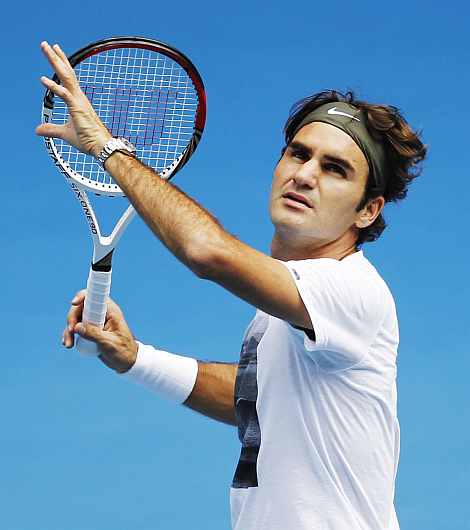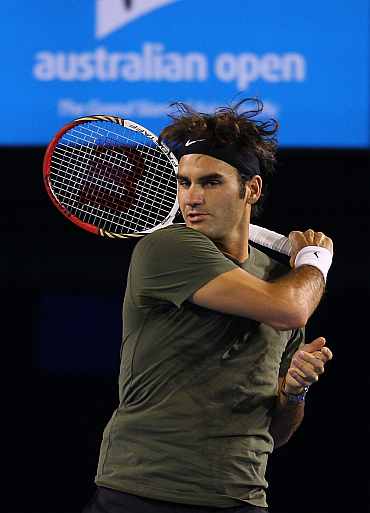 | « Back to article | Print this article |
'Back injury was a real concern'
Roger Federer's remarkable run of appearing at every Grand Slam since 2000 was closer to ending than ever after a back injury at the Qatar Open earlier this month threw his Australian Open participation into doubt.
The 30-year-old Swiss withdrew from the Doha tournament before his semi-final against France's Jo-Wilfried Tsonga.
"I could barely play," said Federer, who will be going for a 17th Grand Slam victory in Melbourne.
"It was on a level that maybe if it's the last match of the season, fine, you can somehow get through it, but not like this.
"That's why I really ... hoped that things improved quickly. (But it) didn't quite do that."
'It was really the only right decision to take'
Federer said it would have been difficult to play in the Australian Open if the injury did not ease off.
"If it would have stayed the way it was in Doha ... then obviously things would have gotten really difficult, let's put it that way.
"You don't want to enter a tournament on painkillers, in a lot of pain, knowing it's going to take two weeks.
"I only started to feel better around Tuesday. Today was my first practice where I could play again at 100 percent."
Federer had described the injury at the time as back spasms, though he said on Saturday that was not really an accurate description as he had been taking painkillers consistently before his withdrawal against Tsonga.
"It was really the only right decision to take. We're talking about the first tournament of the year, it not being a finals, already being on painkillers basically for two matches, being in a lot of pain."
Big Risk
It would have been too big a risk to test the injury in the Doha semis and hope it eased off, he added.
"It just didn't feel right to play at all because there was no point. ... To play on it, take more chances, then maybe even going worse, then it flares up the whole time, that's not what I want. Today all that's gone, so I feel like I'm back to normal.
"That's a good feeling to have coming into the Australian Open now."
'I feel good about my own chances'
Federer's lack of serious injury before a Grand Slam helped him dominate the men's game from 2004 until 2007, when he won 11 of his 16 Grand Slam titles and finished runner-up twice more.
That era of dominance has passed, however, and Federer has been supplanted by first Rafa Nadal and more recently Novak Djokovic as the world's top player.
Briton Andy Murray has also joined the trio as they distance themselves from the rest of the field, though 2009 U.S. Open champion Martin Del Potro, Sweden's Robin Soderling, Czech Tomas Berdych and Tsonga have all shown they are capable of beating the top four on their day.
While Federer was mindful of the field narrowing the gap, he was confident the leading quarter would still be the players to beat in Melbourne.
"I still feel like the top four guys are going to play well again. The question is just whom," he said. "I think we have a good year in store because also right behind us we have very good players at the moment who can really break through.
"I don't quite know what's going to happen yet. I feel good about my own chances. But then again, that doesn't mean much because the others are really playing well at the moment."

© Copyright 2025 Reuters Limited. All rights reserved. Republication or redistribution of Reuters content, including by framing or similar means, is expressly prohibited without the prior written consent of Reuters. Reuters shall not be liable for any errors or delays in the content, or for any actions taken in reliance thereon.



